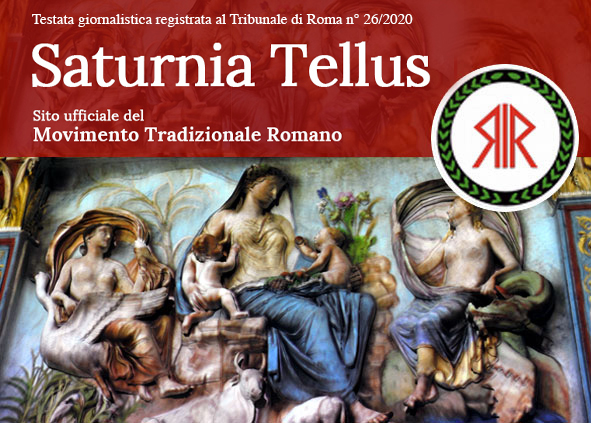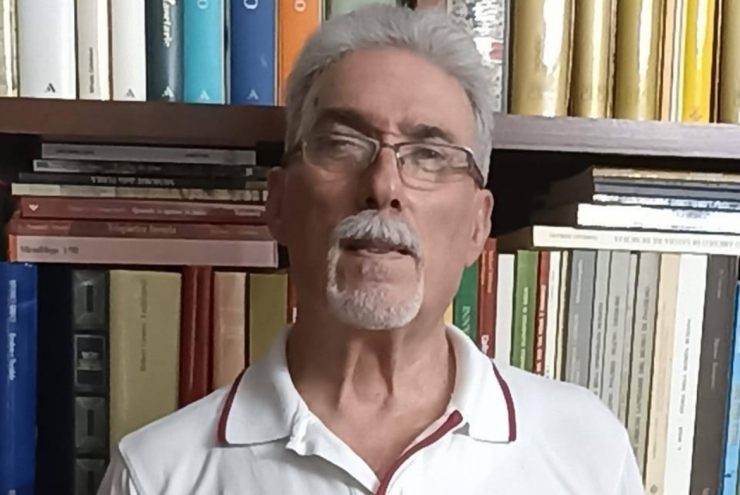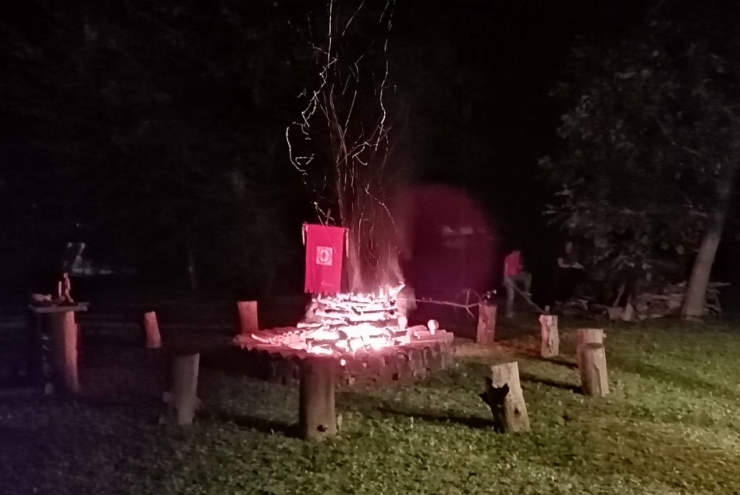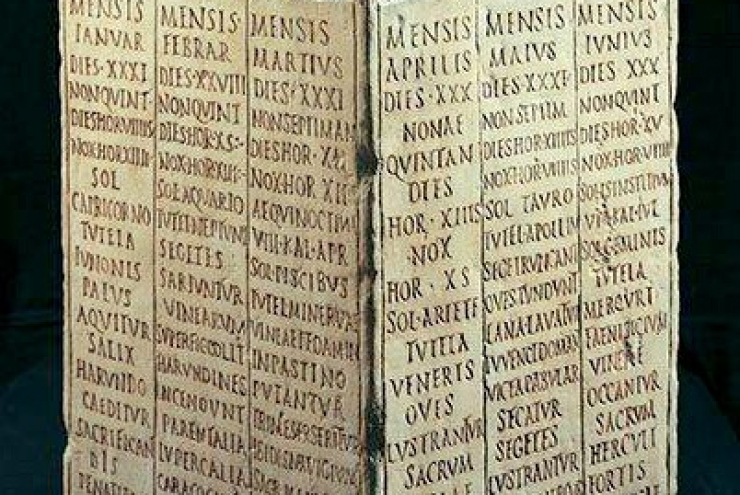Categoria: English
Lesson 8: Gentile Roman Religion, the Private ritual
Lesson 7: Gentile Roman Religion, the Public rituals
Lesson 6: Gentile Roman Religion, the Space
Lesson 5: Gentile Roman Religion, the Festivals
Lesson 4: Gentile Roman Religion, the Calendar
Lesson 3: Gentile Roman Religion, Priestly offices
Lesson 2: General Principles of Gentile Roman Religion
Lesson 1: Gentile Roman Religion, Unity and Multiplicity
The sources of migration in central Italy: the Sikels and the magmatic vortex of the ancient peoples
About the ancient settlements of the Sikels outside of Sicily (Sikelia) and therefore in the peninsular context, I want to remember first, as Jean Bérard did in his monumental book La colonisation grecque de l’Italie et de la Sicile dans l’antiquité, ed. 1941 (which I used and abused of the good italian translation, La Magna […]
Sikels, who really were they? Their origin, their arrival in Latium and Sicily, their relations with other Italic populations
The Sikels undertook the escape for safety, finding the hostility of many other tribes, especially those ones from oscan stock (the heirs of the pit-tombs Culture), arriving then in the territory of their ‘’cousins’’ Enotrians, who gave them a welcome, at least in the first time. There, in present-day Calabria, the Sikels became numerous and […]
Thou shalt not touch the Roman Arch
When we look at our monuments, we actually see a hologram, a projection of material evidence on the surface of the temporal present. If we do not make an effort to perceive and understand its verticality with the relative overlap of the eras that followed one another, we can make a colossal blunder. To make […]
European Urheimat, a river in flood with effluents
The belonging of the Latins to the Indo-European lineage is undisputed. However, the identification of the original land of the Indo-Europeans is still open today. In the short history from the earliest linguistic theories to today, explanations have emerged which often, even if overcome by the same science that generated them, continue to have followers, […]
The Metamorphoses by Ovid: the myth of Io
Ovid’s Metamorphoses. I, 568 – 779. Mutations as unbalance of opposite cosmic principles: the myth of Io closes the series on the first book of Ovid’s Metamorphoses and presents a neoplatonic interpretation of the relation between Jupiter and Juno. I, 568 – 779 Est nemus Haemoniae, praerupta quod undique claudit silva: vocant Tempē; per quae […]
When Ethics becomes etiquette only the Virtus helps the crisis
Dedicated to my father, an example of Virtus. We live in an era where ethics has been disintegrated among a thousand labels and small groups, bought by a capitalism regulated only on paper and which reasons with the stomach, voraciously seeking the immediate benefit without looking in the face of anyone, while engulfing entire states. […]
The Metamorphoses by Ovid: Apollo and Daphne
Ovid’s Metamorphoses I, 434 – 567: Apollo e Daphne. I, 434 – 567 Ergo ubi dīluviō tellus lutulenta recenti sōlibus aetheriīs altōque recanduit aestū, ēdidit innumerās speciēs partimque figūrās rettulit antiquās, partim nova monstra creāvit. Illa quidem nollet, sed tē quoque, maxime Pȳthon, tum genuit, populīsque novīs, incognite serpens, terror erās: […]
The attitude of the Indo-Europeans Latins: they assimilated the Italic traditions
It is known that Latin has an Indo-European origin and this rightly leads us to believe that our culture is also rooted in this vast family of initially nomadic peoples who have invaded Europe in multiple waves over time. However, the stories of the founding of Rome and the Roman Kingdom do not describe a […]
The Metamorphoses by Ovid: The Flood
Metamorphoses by Ovid. I, 253 – 434: The Flood. I, 253 – 434 Iamque erat in tōtās sparsūrus fulmina terrās; sed timuit, nē forte sacer tot ab ignibus aether conciperet flammās longusque ardesceret axis. Esse quoque in fātīs reminiscitur adfore tempus, quō mare, quō tellus correptaque rēgia caelī ardeat […]
Sit tibi terra levis, Vlassis Rassias
“No suffering can happen to a fair man, either during life or after death” This morning a mate and long-standing friend informed us that Vlassis Rassias, the head of the big heathen community of Greece YSEE (Ellenic’ Council) is passed away. The news, unexpected, came like a slap. While I’m writing i don’t know […]
The Metamorphoses by Ovid: Lykaon trasformed into a wolf
Metamorphoses by Ovid. I, 151-252: Lykaon I, 151-252 Nēve foret terrīs sēcūrior arduus aether, adfectasse ferunt regnum caeleste Gigantās altaque congestōs struxisse ad sīdera montēs. Tum pater omnipotens missō perfrēgit Olympum fulmine et excussit subiectae Pēlion Ossae; obruta mole suā cum corpora dīra iacērent, perfūsam multō natōrum sanguinem Terram inmaduisse ferunt calidumque animasse […]
Latin, The European Language
The European Union is a gigantic unfinished project, a job half done, left at the mercy of the banks and with little attention to its citizens. If you don’t believe it, just try to move out. In my fair experience of international relocations, I have been resident in four different European countries and have encountered […]
The Metamorphoses by Ovid: The Fall
Metamorphoses by Ovid. I, 113-150: The Fall I, 113-124 “Dē aetāte argenteā” Postquam Sāturnō tenebrōsa in Tartara missō sub Iove mundus erat, subiit argentea prōlēs aurō dēterior, fulvō pretiōsior aere. Iuppiter antīquī contraxit tempora vēris, perque hiemēs aestusque et inaequālīs autumnōs et breve vēr spatiīs exēgit quattuor annum. Tum prīmum siccīs āēr fervōribus ustus canduit, […]
The correct execution of Rituals is the basis of our Tradition
The white linen dress on the skin. Scent of incense while the sacred flame burns on the lararium. Powerful invocation formulas on an ancient melody. Aware of the uniqueness of this precise moment and of its eternity, I feel the presence of the divine. A shiver runs through my back. Those who have had the […]
The Metamorphoses by Ovid: The Golden Age
Metamorphoses by Ovid. I, 76-112: Human beings and the Golden Age I, 76-88 “Dē genere hūmānō” Sanctius hīs animal mentisque capācius altae dēerat adhūc et quod domināri in cētera posset: natus homo est, sīve hunc dīvīnō sēmine fēcit ille opifex rērum, mundī meliōris orīgo, sīve recens tellus sēducta nūper ab altō aethere cognātī retinēbat sēmina […]
The Metamorphoses by Ovid: The Formation of The Cosmos
The Metamorphoses by Ovid. I, 20-75: The formation of the cosmos I, 21-75 “The formation of the cosmos” 21. Hanc deus et melior lītem nātūra dirēmit; nam caelō terrās et terrīs abscidit undās et liquidum spissō secrēvit ab āere caelum; quae postquam ēvolvit caecōque exēmit acervō, 25. dissociāta locis concordi pāce ligāvit. Īgnea convexī vīs et […]
A Travel toward Neoplatonic Mysticism: Gemistus Plethon (XV)
In the fifteenth century we Italians were divided into more than a dozen states, often at war with each other, each with its own history and customs, but the same root. Perhaps thanks to this common root the spirit of our ancient classical tradition re-emerged, giving rise to a cultural movement that forever changed the […]
The Metamorphoses by Ovid: The Chaos
I, 1-4 “Introduction” In nova fert animus mūtātās dīcere formās corpora: dī, coeptīs (nam vōs mūtāstis et illās) adspīrāte meīs prīmāque ab orīgine mundī ad mea perpetuum dēdūcite tempora carmen. Translation(*) My soul inclines to speak of the transformation of forms into new bodies: o Gods, please assist my enterprise (in fact you have also […]
The sources of the Roman Private Ritual
INTRODUCTION It is possible to individuate two intertwined, but distinct, dimensions in the religious conception of Cult in Ancient Rome, the Public Cult, linked to the welfare of the Roman State, and Private or Domestic Cult. This presentation aims to briefly illustrate the ancient sources of the contemporary Roman Private Cult, showing its most […]
For the first time in Rome the European Congress of Ethnic Religions
A great four-day event, with the participation of delegations from fifteen European countries and a representation from the US, culminated in an intense and luminous common ritual on the sacred hill of the Palatine on the 2771st anniversary of Rome foundation, the “Dies Natali”. So it was the sixteenth Congress of the ECER – European […]
A Travel toward Neoplatonic Mysticism. Proclus (XIV)
An exhibition, a statue, Proclus. In a dark winter Sunday of wind and rain I decide to visit a modern art exhibition in a museum close by my house. I cross the main entrance, I pay the ticket and go into the hall without having a good idea of what to expect. Around me, there […]
A Travel toward Neoplatonic Mysticism. Iamblicus (XIII)
Iamblichus’ Theurgy According to the Platonic philosophy, the condition for the birth of a person is the encounter of a soul with a body. What is the relationship of the soul with the material world? Does it bind completely to the body after having crossed the seven planetary spheres? Or does a part of the […]
A Travel toward Neoplatonic Mysticism. The Theurgy (XII)
“I have studied more than you”: this is, in a nutshell, the recurring point of today’s disputes over Religio. I have seen it a thousand times in a thousand ways, in the academic sphere, between associations, among people. However, we should note that this characteristic is present only today, as it is not evident that […]
Il Congresso Europeo delle Religioni Etniche a Roma, 19/22 aprile (English v.)
Le sedicesime Assise dell’ECER (European Congress of Ethnic Religions) si terranno a Roma dal 18 al 22 aprile 2018. Lo ha deciso il Board dell’Ecer che ha deliberato che tutta l’organizzazione venisse delegata al M.T.R. e al suo presidente Daniele Liotta. La coincidenza dell’evento con il 2771° Anniversario della Fondazione di Roma (MMDCCLXXI aUc) è […]
A travel toward Neoplatonic Mysticism. Porphyry (XI)
Porphyry’s legacy: the reaction of the polytheistic tradition against globalist Christianity. “The crap of the gospels should be taught to old ladies and not to reasonable people. Anyone who takes the trouble to examine the facts told by Christians with a little of attention would find thousands of similar stories but without a shred of […]
A Travel toward Neoplatonic Mysticism. Plotinus (X)
Plotinus: the foundation of Neoplatonism. By the middle of the third century, the times were ripe for the foundation of Neoplatonism. Plotinus had certainly captured the legacy of his master Ammonius Sacca, who, like Socrates, had left nothing written, but probably had positions very close to Plotinus’ Neoplatonism. Numerous writings of Numenius of Apamea were […]
A Travel Toward Neoplatonic Mysticism. Chaldean Oracles (IX)
At the dawn of Neoplatonism: Chaldean Oracles. During the reign of Marcus Aurelius, Julian the Theurgist, son of Julian the Chaldean, received a series of divine messages that were later referred to as the Chaldean Oracles (χαλδαικὰ λόγια) for their Mesopotamian style and that became soon an essential component to the nascent Neoplatonism. These texts, […]
A Travel Toward Neoplatonic Mysticism. Numenius from Apamea (VIII)
“We can understand material objects by comparison to similar objects, looking at the similarities of the surrounding things. But concerning the Good, there is no way to know it, neither by comparison with material objects nor with any perceptible thing that could resemble it. Hence, we need a different approach. Like when a person observes […]
A Travel Toward Neoplatonic Mysticism. The Stoicism (VII)
Stoicism, a Roman way of life Only when the reason of a man is perfect, there is good for him. But what kind of good is it? I’m telling you: a free soul, noble, able to rule everything, and being ruled by nothing. [SENECA] Our life depends on Fate, which drags us without compassion, sometimes […]
A Travel Toward Neoplatonic Mysticism. Aristotle’s ousiology and theology (VI)
Aristotle’s Metaphysics: ousiology and theology. In the previous article we have introduced Aristotle’s Metaphysics and its division in four disciplines: etiology (search of the first causes), ontology, ousiology, and theology. As we have already treated the first two, in this article we complete this introduction to Aristotle’s Metaphysics introducing ousiology and theology. Ousiology Let’s present […]
A Travel Toward Neoplatonic Mysticism. Aristotle’s etiology and ontology (V)
Plato was a great visionary, a revolutionary of philosophy, a valiant captain crossing the Ocean of Knowledge. He dared to leave the natural philosophy of the perceptible world and to reach the verticality of the world of forms. He understood that earlier philosophy was not dealing with reality, but with an incomplete and deluding representation […]
A Travel Toward Neoplatonic Mysticism. From Omero to Proclo (IV)
Theology is a kind of afterthought of the divine using a philosophical approach. The religious sphere is interpreted under the light of reason, of logos, in a philosophical way. The philosophy of Plato and his followers analyzed critically the ancient mythology and generated a new understanding of divinity through theology. This article introduces the first […]
The Greek State has recognized the Hhellenic Ethnic Religion. Interview with Rassias
The Supreme Council of Ethnikoi Hellenes (Ysee), the religious organization that works to restore the ancient Greek polytheist religion, received from the Greek government, in April, the legal status for its worship activities. This has happened after years of struggles and a first denial, in 2015. The pronunciation is from the Ministry of Education and […]
A Travel Toward Neoplatonic Mysticism. The Cosmology of the Timaeus (III)
A philosopher is not an isolated being projected into human history from a U.F.O., but a real person with flesh and bones, a person whose mind is inclined to understand the big picture. Even if the object of investigation is subtle and ephemeral, the philosopher uses his own set of knowledge, experience, beliefs, language and […]
A Travel Toward Neoplatonic Mysticism. Introduction to Plato (II)
Before proceeding with other great figures of Ancient Philosophy, it is worth to make some more considerations on the epochal change introduced by Plato, a new understanding of the world that is still today challenging the post-modern materialism. It is undeniable that the great achievements of the scientific method have had a huge positive impact […]
A Travel Toward Neoplatonic Mysticism. A philosophical itinerary (I)
I don’t remember how I happen to know the “Platonic Theology” by Proclus. I found that fat volume maybe for chance, maybe for fate, or for the will of a daemon. During my reading I found an incredible logic construction that was explaining the great divine metaphysics, revealing the philosophical aspects of every divinity of […]
E.C.E.R. issues statement on indigenous resistance at Standing Rock
The European Congress of Ethnic Religions, with members in 23 nations of Europe, wish to express our support for our Indigenous Brothers and Sisters of North America, in their struggle to preserve their sacred waters and their ancestral lands at Standing Rock, North Dakota, U.S.A. The Dakota Access Pipeline is an environmental disaster waiting to […]
The MTR takes part in the European Congress of Ethnic Religions. The chronicle
Four full days – spent between public meetings, ceremonies, private sessions and cultural visits to significant places of paganism – have marked the fifteenth European Congress of ethnic religions held 14 to 17 July 2016 Prague. The Roman Traditional Movement participated with a delegation including the president Daniele Liotta, the deputy Guglielmo Giovanelli Marconi and […]
Which is the nature of the immortal Gods? The direct experience of the divine and its interpretation
Scripsit Forī Hadriani, a.d.III Idus Dec, MMDCCLXIX aUc. How does the compass app of the Smartphone work? I was trying to forget the question and to relax, while I was proceeding along a narrow path, inside the shadowy wood of the Říp mountain, in the Northern Bohemia, around 40 km north of Prague. Summer […]
















